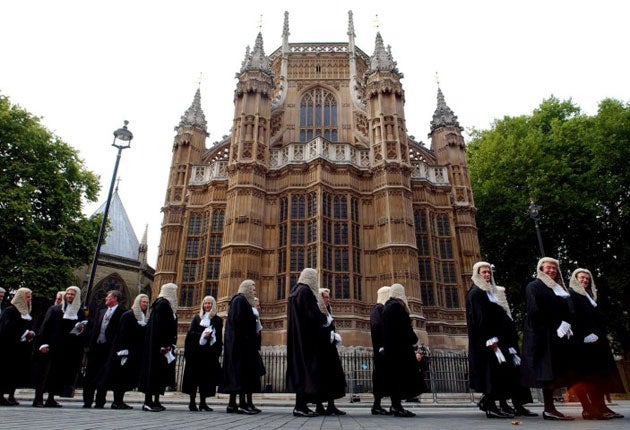Now the expenses spotlight falls on Britain's judiciary
First-class train tickets, airfares and dining bills take annual claims by judges and magistrates to £32m

Expenses claims by judges and magistrates have risen by £3m in the last two years, according to figures obtained by The Independent under the Freedom of Information Act.
First-class train tickets, air fares, hotels and dining bills are among the record £32m claims made by the judiciary this year. The figure includes compensation paid to judges who buy homes closer to the courts where they work, and nightly allowances of £32 when they choose to stay at their second homes.
Under the claims for hotel accommodation, judges receive a maximum of £146 a night when they travel to London to hear a court case and £126 a night when they venture outside the capital. Sometimes judges have to spend weeks at a time on circuit when they can claim thousands of pounds in expenses.
Under guidance issued by the Ministry of Justice, salaried judges whose work requires them to move on a permanent basis to a different part of the country are entitled to claim "assistance" towards the additional costs of relocation. Compensation is paid for help with legal fees, stamp duty, estate agents and the cost of hiring a removal van. Under these rules reimbursement of up to £8,000 is exempt from tax and National Insurance contributions.
Night subsistence payments are only payable where a judge is required to be away from his or her normal home on judicial business. And the more environmentally friendly judiciary can claim 20p for every mile travelled on a bicycle.
The Ministry of Justice said it was unable to provide information on expenses claims for individual judges because this would cost too much money under the terms of Freedom of Information Act.
An official explained: "The Ministry records judicial office holders' expenses claims in a way which does not enable them to be readily attributed to individuals or easily broken down according to the type of claim, beyond the category of 'judicial travel and subsistence'. This is because the systems of authorisation and control are regarded as sufficient for the purposes of ensuring propriety of expenditure."
But the Lord Chief Justice said he was committed to publishing individual expense claims for the senior judiciary from next year.
The expenses bill for the 3,679 fee-paid and salaried judges for this year was £3,676,333 – a rise of more than £500,000 in the last two years. There was a similar increase for those serving on tribunals. For the volunteer force of magistrates the increase is just over £2m in the same period.
But judges lucky enough to be sent to a part of the country where there are stated-owned judicial lodgings can enjoy the services of chauffeurs, butlers and chefs. These 32 historic homes can cost as much as £2,000 a night and include penthouse flats and Georgian town houses. The cost of judges' lodgings are met by the general budget of the Ministry of Justice rather than the expenses scheme.
A spokesman for the Judicial Communications Office said: "Judges and magistrates can only claim expenses in limited circumstances, and this largely relates to travel and subsistence expenses incurred in the course of their judicial duties. There are 10,600 judicial office holders (including all fee-paid judges) and 30,000 magistrates.
Travel by judges is part and parcel of keeping the courts and justice system working. There are rates for travel and subsistence, and – as with the civil service – payment follows the processing of receipts and claims by civil servants."
He added: "The expenses claimed by both judges and tribunals judiciary decreased in 2008/09 from that paid out in 2007/08. Magistrates serve the community voluntarily and are not paid a salary, although they are able to claim travel, subsistence and financial loss allowances, which are limited to specific amounts."
Join our commenting forum
Join thought-provoking conversations, follow other Independent readers and see their replies
Comments
Bookmark popover
Removed from bookmarks